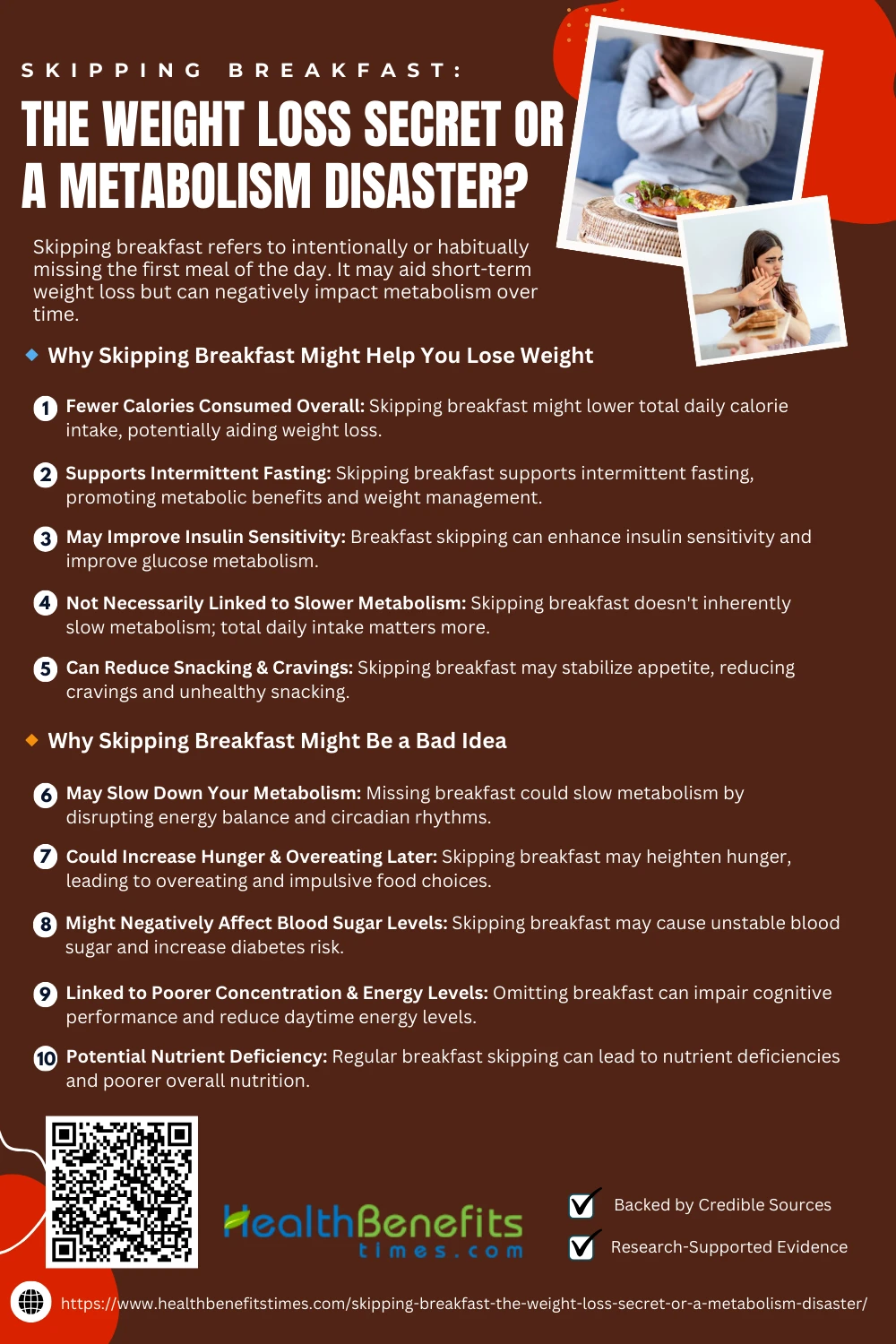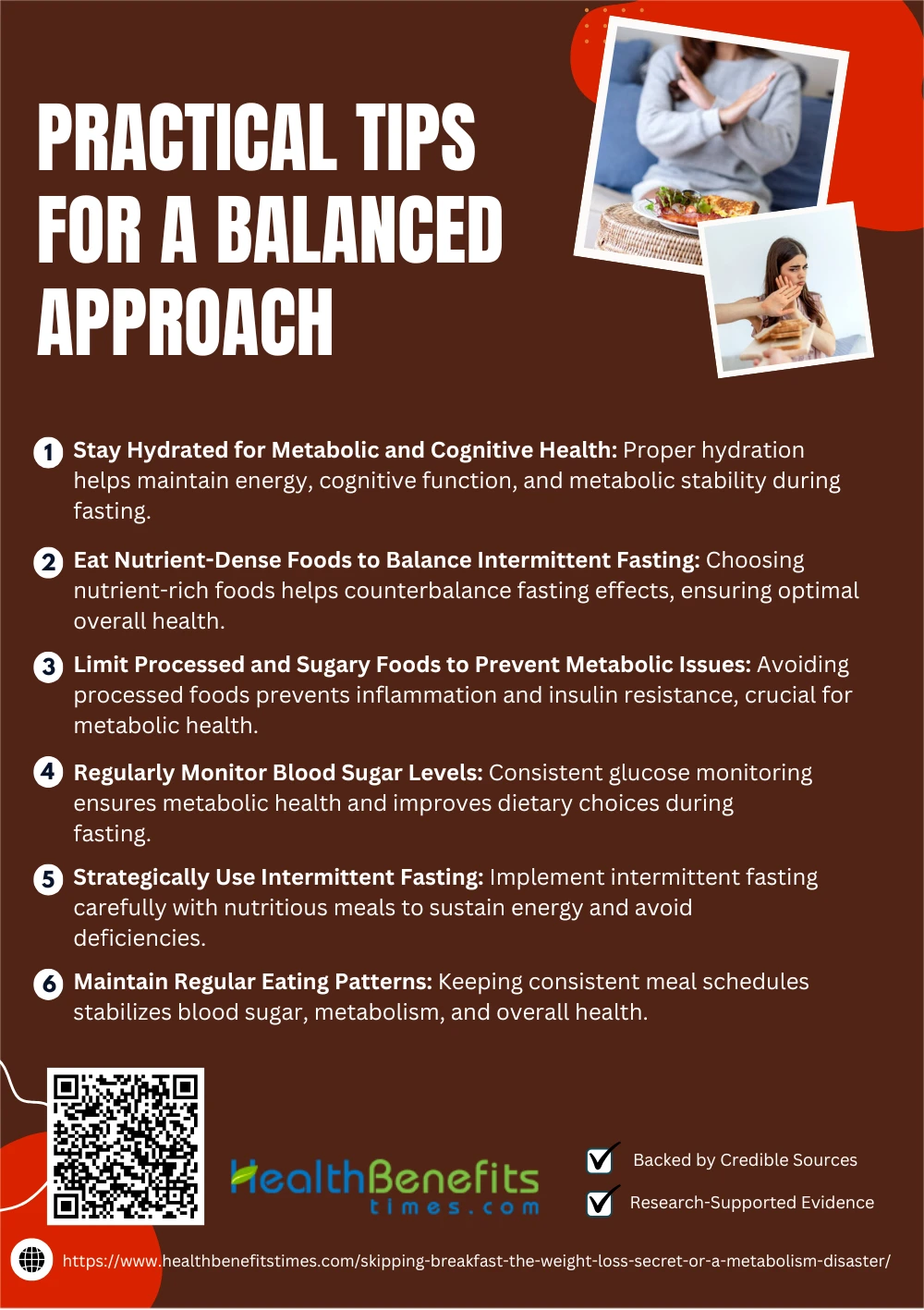- Skipping breakfast refers to intentionally or habitually missing the first meal of the day.
- It may aid short-term weight loss but can negatively impact metabolism over time.
- Long-term breakfast skipping can lead to nutritional deficiencies and decreased energy levels.
 Skipping breakfast refers to the deliberate omission of the first meal of the day, often as part of dietary practices like intermittent fasting or calorie restriction strategies. The debate over skipping breakfast has long divided health experts. On one side, proponents argue that skipping breakfast can facilitate weight loss by promoting caloric restriction and improving metabolic flexibility. Research suggests that extended fasting periods, such as skipping breakfast, may enhance fat oxidation and regulate insulin sensitivity, which could benefit individuals aiming for weight management.
Skipping breakfast refers to the deliberate omission of the first meal of the day, often as part of dietary practices like intermittent fasting or calorie restriction strategies. The debate over skipping breakfast has long divided health experts. On one side, proponents argue that skipping breakfast can facilitate weight loss by promoting caloric restriction and improving metabolic flexibility. Research suggests that extended fasting periods, such as skipping breakfast, may enhance fat oxidation and regulate insulin sensitivity, which could benefit individuals aiming for weight management.
Conversely, opponents warn that avoiding breakfast might disrupt metabolic homeostasis, leading to increased hunger and overeating later in the day. Studies indicate that individuals who regularly skip breakfast tend to have higher levels of visceral fat accumulation and an increased risk of metabolic syndrome. Moreover, skipping breakfast has been associated with negative effects on cognitive performance, including reduced concentration and energy levels throughout the day. A significant factor influencing the impact of skipping breakfast is circadian rhythm alignment, which determines how meal timing affects metabolism and overall health. Some research suggests that eating earlier in the day aligns better with the body’s natural metabolic cycles, optimizing nutrient utilization and reducing fat storage. However, findings remain inconclusive, with some reports showing no significant impact on metabolism or energy expenditure.
The Science behind Skipping Breakfast
Skipping breakfast has profound effects on metabolism and overall health, with studies showing both benefits and risks. Research indicates that skipping breakfast can influence circadian rhythms and disrupt hormonal regulation, potentially leading to metabolic imbalances. Some evidence suggests that intermittent fasting, which often includes skipping breakfast, enhances fat oxidation and improves insulin sensitivity. However, other studies warn that breakfast omission may contribute to higher stress levels and reduced cognitive performance. Additionally, prolonged fasting can alter gut microbiota composition, influencing digestive health and nutrient absorption. While some individuals may experience improved metabolic flexibility, others might suffer from increased hunger and energy crashes later in the day. The long-term impact of breakfast skipping largely depends on individual lifestyle, activity levels, and dietary choices.
Skipping Breakfast: Weight Loss Secret or Metabolism Disaster?
The debate over skipping breakfast continues to stir discussions in health and nutrition circles. Some say it aids weight loss, while others warn it could mess with your metabolism. Here’s a breakdown of the key arguments.
🔹 Why Skipping Breakfast Might Help You Lose Weight
1. Fewer Calories Consumed Overall
Research suggests that skipping breakfast often leads to a reduction in overall daily calorie intake. Studies indicate that individuals who omit breakfast tend to consume fewer total calories throughout the day, as they do not fully compensate for the missed meal. (1) Some findings show that skipping breakfast is associated with lower energy intake and potential weight loss benefits. (2) However, others argue that it may lead to increased hunger later in the day, potentially influencing unhealthy snacking habits. (3) Additionally, timing and meal composition play a crucial role in metabolic responses. (4) While intermittent fasting approaches often include breakfast skipping, individual metabolic effects vary significantly. (5)
2. Supports Intermittent Fasting
Skipping breakfast aligns well with intermittent fasting by extending the fasting window, promoting metabolic benefits such as enhanced fat oxidation and improved insulin sensitivity. Studies indicate that time-restricted eating strategies, including skipping breakfast, can aid in weight management and reduce inflammation. (5) Additionally, intermittent fasting has been linked to improved glucose regulation and cardiovascular health. (6) However, the effectiveness of skipping breakfast varies based on individual metabolic responses. (7) Overall, research suggests that structured fasting patterns may offer longevity benefits and improved cognitive function. (8)
3. May Improve Insulin Sensitivity
Research suggests that skipping breakfast may enhance insulin sensitivity by reducing prolonged exposure to high insulin levels and promoting metabolic flexibility. (9) Time-restricted eating patterns, including breakfast omission, have been linked to improved glucose regulation and reduced insulin resistance. (10) Studies indicate that intermittent fasting, often involving breakfast skipping, can lower postprandial glucose levels and enhance overall metabolic health. Additionally, circadian rhythm alignment plays a crucial role in optimizing insulin response. (6) However, effects may vary based on individual dietary habits and activity levels. (8)
4. Not Necessarily Linked to Slower Metabolism
Research suggests that skipping breakfast does not necessarily slow down metabolism. Studies indicate that meal timing has a minimal effect on resting metabolic rate (RMR), and overall daily energy expenditure remains unchanged whether breakfast is consumed or skipped. (11) Some evidence even suggests that fasting periods may improve metabolic flexibility, enhancing fat oxidation rather than decreasing metabolism. (2) Additionally, intermittent fasting approaches that involve skipping breakfast have been shown to support metabolic health without negatively impacting caloric expenditure. (12) While skipping breakfast may affect appetite regulation, it does not inherently lead to long-term metabolic slowdown. (13) Instead, total daily food intake and activity levels play a more crucial role in metabolic rate. (14)
5. Can Reduce Snacking & Cravings
Skipping breakfast may help reduce snacking and cravings by stabilizing blood sugar levels and promoting appetite control throughout the day. (15) Studies suggest that meal skipping can lower ghrelin levels, a hormone responsible for hunger, leading to fewer cravings for processed and high-calorie foods. (16) Additionally, intermittent fasting approaches that include skipping breakfast have been associated with better self-regulation of food intake. (5) This may prevent late-night binge eating and improve overall dietary choices. (2) However, effects may vary based on individual metabolism and lifestyle habits. (6)
🔸 Why Skipping Breakfast Might Be a Bad Idea
6. May Slow Down Your Metabolism
Skipping breakfast may contribute to metabolism slowdown by altering energy balance and reducing thermogenesis, the body’s process of burning calories for heat production. (17) Some studies suggest that missing breakfast can disrupt circadian rhythms, leading to metabolic inefficiency. (18) Additionally, skipping breakfast has been linked to reduced energy expenditure throughout the day, affecting overall caloric burn. (19) Chronic breakfast omission may also negatively impact insulin response, slowing metabolic processes. (20) However, individual metabolism and activity levels play a significant role in mitigating these effects. (21)
7. Could Increase Hunger & Overeating Later
Skipping breakfast may lead to increased hunger and overeating later in the day, as it disrupts appetite-regulating hormones such as ghrelin and leptin. (22) Studies show that individuals who skip breakfast are more likely to crave high-calorie foods and make impulsive eating choices. Additionally, prolonged fasting from morning to mid-day may increase meal sizes later, leading to higher calorie consumption overall. (23) Research also suggests that skipping breakfast could lead to increased emotional eating, particularly in individuals prone to stress-induced food consumption. (24) Ensuring a balanced morning meal may help regulate appetite and reduce overeating throughout the day. (25)
8. Might Negatively Affect Blood Sugar Levels
Skipping breakfast may negatively impact blood sugar regulation, increasing insulin resistance and glucose fluctuations. (26) Research suggests that missing the morning meal can result in higher postprandial blood sugar spikes after lunch and dinner, contributing to metabolic disturbances (USWR). Studies indicate that individuals who consistently skip breakfast have an increased risk of Type 2 diabetes, due to impaired glucose metabolism and insulin sensitivity. (27) Moreover, skipping breakfast has been linked to higher daily blood glucose variability, which can elevate the risk of cardiovascular disease. (28) To maintain stable blood sugar levels, consuming a nutrient-rich breakfast may help improve insulin function and metabolic control. (29)
9. Linked to Poorer Concentration & Energy Levels
Skipping breakfast has been associated with reduced cognitive function and lower energy levels, particularly in students and working professionals. (30) Research suggests that individuals who skip breakfast may experience slower reaction times and reduced attention span, impairing daily productivity. (31) Additionally, breakfast omission can lead to fluctuating blood sugar levels, which may cause mid-morning fatigue and lack of focus. (32) Studies indicate that proper morning nutrition supports brain function and prevents cognitive decline, especially in younger individuals. (33) Thus, regular breakfast consumption may enhance memory, concentration, and energy stability. (34)
10. Potential Nutrient Deficiency
Regularly skipping breakfast may lead to nutrient deficiencies, as it reduces the overall intake of essential vitamins and minerals needed for optimal health. (35) Studies indicate that breakfast eaters tend to consume more fiber, calcium, and iron, while those who skip breakfast may have lower levels of essential nutrients. (36) Research also suggests that individuals who skip breakfast are at higher risk of deficiencies in Vitamin D and B-complex vitamins, which play a crucial role in energy metabolism and immune function. (5) Additionally, breakfast skippers often make poorer food choices later in the day, further exacerbating nutrient imbalances. To maintain nutritional adequacy, it is crucial to either consume a balanced breakfast or ensure that missing nutrients are included in later meals. (37)
Does Skipping Breakfast Slow Your Metabolism?
Contrary to common belief, skipping breakfast does not necessarily slow down metabolism. Research indicates that resting metabolic rate (RMR) remains largely unaffected by meal timing, and total energy expenditure does not significantly decrease when breakfast is omitted. (5) Some studies suggest that prolonged fasting can enhance fat oxidation and improve metabolic flexibility without lowering overall energy burn. (38) However, skipping breakfast may alter appetite regulation, potentially leading to overeating later in the day. (39) Moreover, the impact of meal skipping on metabolism varies by individual dietary habits and physical activity levels. (40) Therefore, while breakfast omission does not directly slow metabolism, its effects depend on overall calorie balance and lifestyle choices. (41)
Skipping Breakfast & Long-Term Health Risks
Skipping breakfast regularly can negatively impact your long-term health, increasing the risk of obesity, diabetes, heart disease, impaired cognitive function, hormonal imbalances, low energy levels, and poor nutritional status.
1. Increased Risk of Cardiovascular Disease
Research suggests that skipping breakfast is linked to higher risks of cardiovascular disease, as it can lead to elevated blood pressure, increased cholesterol levels, and arterial stiffness. (42) Additionally, studies show that irregular meal patterns, such as missing breakfast, may contribute to higher inflammation levels and metabolic disturbances, which are associated with heart disease and stroke. (43)
2. Higher Risk of Type 2 Diabetes
Regularly skipping breakfast has been associated with impaired insulin sensitivity and higher fasting blood glucose levels, increasing the risk of developing Type 2 diabetes. (44) Studies indicate that missing the morning meal can disrupt glucose metabolism, leading to elevated postprandial blood sugar spikes throughout the day, especially in individuals predisposed to metabolic disorders. (45)
3. Increased Risk of Stroke
Studies suggest that skipping breakfast can elevate stroke risk, potentially due to its effects on blood pressure, cholesterol levels, and cardiovascular health. (46) Research also indicates that irregular meal patterns may contribute to higher systemic inflammation, increasing the likelihood of stroke and other cerebrovascular diseases. (47)
4. Cognitive Decline and Lower Productivity
Research shows that skipping breakfast can impair cognitive function, memory, and attention span, leading to decreased academic and work productivity. (48) Regular breakfast consumption has been linked to improved concentration and mental performance, particularly in children and young adults, preventing long-term cognitive decline. (49)
5. Metabolic Syndrome and Digestive Issues
Skipping breakfast has been linked to metabolic syndrome, which includes increased risks of obesity, insulin resistance, and hypertension. (50) Additionally, meal skipping can negatively impact gut health, leading to digestive issues like acid reflux, bloating, and poor nutrient absorption due to irregular eating patterns. (51)
6. Poorer Nutritional Intake & Deficiencies
Skipping breakfast has been linked to lower intake of essential nutrients such as fiber, calcium, iron, and vitamins B and D, which are critical for overall health. (33) Studies show that frequent breakfast omission can lead to imbalanced diets and long-term deficiencies, negatively impacting immune function and bone health. (52)
7. Negative Impact on Mood and Mental Health
Research suggests that skipping breakfast is associated with higher levels of stress, anxiety, and depressive symptoms, particularly in adolescents and working professionals. (53) Studies indicate that a regular morning meal helps regulate mood by stabilizing blood sugar levels and neurotransmitter function, improving overall mental well-being.
Who Should and Shouldn’t Skip Breakfast?
Skipping breakfast can be beneficial for some but risky for others. Intermittent fasting practitioners and healthy adults with stable blood sugar levels may benefit from meal skipping for metabolic flexibility and weight control. (54) However, children, adolescents, diabetics, and individuals with gastrointestinal disorders should avoid skipping breakfast as it may cause nutrient deficiencies and digestive issues. (55) Additionally, pregnant women and people with high energy demands require regular morning nutrition for optimal health.
Practical Tips for a Balanced Approach
Skipping breakfast occasionally can fit into a healthy lifestyle if done wisely. Learn practical strategies to balance intermittent fasting, manage energy levels, maintain nutrition, and support overall long-term wellness effectively.
1. Stay Hydrated
Proper hydration is essential for maintaining metabolic balance and energy levels when skipping breakfast. Research indicates that hydration supports digestion and nutrient absorption, reducing fatigue and cravings during fasting periods. (56) Additionally, staying hydrated helps regulate electrolyte balance and cognitive function, which can be affected by prolonged fasting. (57)
2. Prioritize Nutrient-Dense Meals
Skipping breakfast requires consuming nutrient-dense meals later in the day to maintain adequate energy and vitamin intake. (58) Studies show that meals rich in fiber, protein, and healthy fats enhance satiety and prevent excessive hunger. (59) Additionally, a diet incorporating whole foods, lean proteins, and antioxidants can help counterbalance the effects of intermittent fasting and support overall health. (60)
3. Avoid Processed and Sugary Foods
Avoiding processed and sugary foods is essential for maintaining a balanced diet, as excessive sugar intake can lead to insulin resistance and metabolic disorders. (61) Research suggests that processed foods contribute to chronic inflammation and increase the risk of obesity and cardiovascular disease. (62) Additionally, consuming natural, whole foods supports better digestion and overall nutrient absorption. (63)
4. Monitor Blood Sugar Levels
Monitoring blood sugar levels is crucial for maintaining energy balance and preventing diabetes-related complications. Studies suggest that regular glucose monitoring helps in detecting fluctuations that may impact metabolism. (64) Research indicates that using wearable glucose monitors can improve dietary decisions and overall metabolic health. (65) Additionally, maintaining consistent meal timing can help stabilize blood sugar and reduce cravings. (66)
5. Incorporate Intermittent Fasting Strategically
Incorporating intermittent fasting strategically can enhance metabolic health and improve insulin sensitivity. Research suggests that timing fasting periods with circadian rhythms maximizes its benefits. Studies indicate that personalizing fasting schedules based on lifestyle and energy needs improves adherence and results. (5) Additionally, integrating nutrient-dense meals during eating windows prevents deficiencies and ensures sustained energy levels. (67)
6. Maintain a Balanced Eating Schedule
Maintaining a consistent eating schedule supports stable blood sugar levels and metabolic function. Research highlights that regular meal timing reduces the risk of obesity and cardiovascular disease. (68) Furthermore, a well-balanced eating schedule enhances energy levels and cognitive performance throughout the day. (69)
Conclusion
Skipping breakfast isn’t a guaranteed weight loss secret nor an absolute metabolism disaster—it depends largely on individual lifestyle, dietary habits, and health goals. While intermittent fasting can support weight management for some, consistently neglecting breakfast may negatively impact metabolism, energy levels, and nutrient intake in others. To achieve sustainable health benefits, it’s essential to listen to your body’s needs, prioritize balanced nutrition, and adopt mindful eating habits tailored to your personal circumstances.




